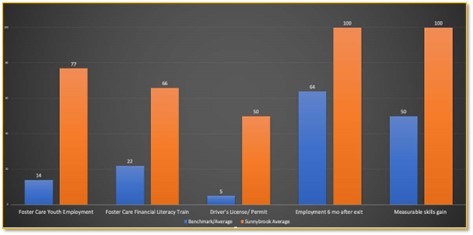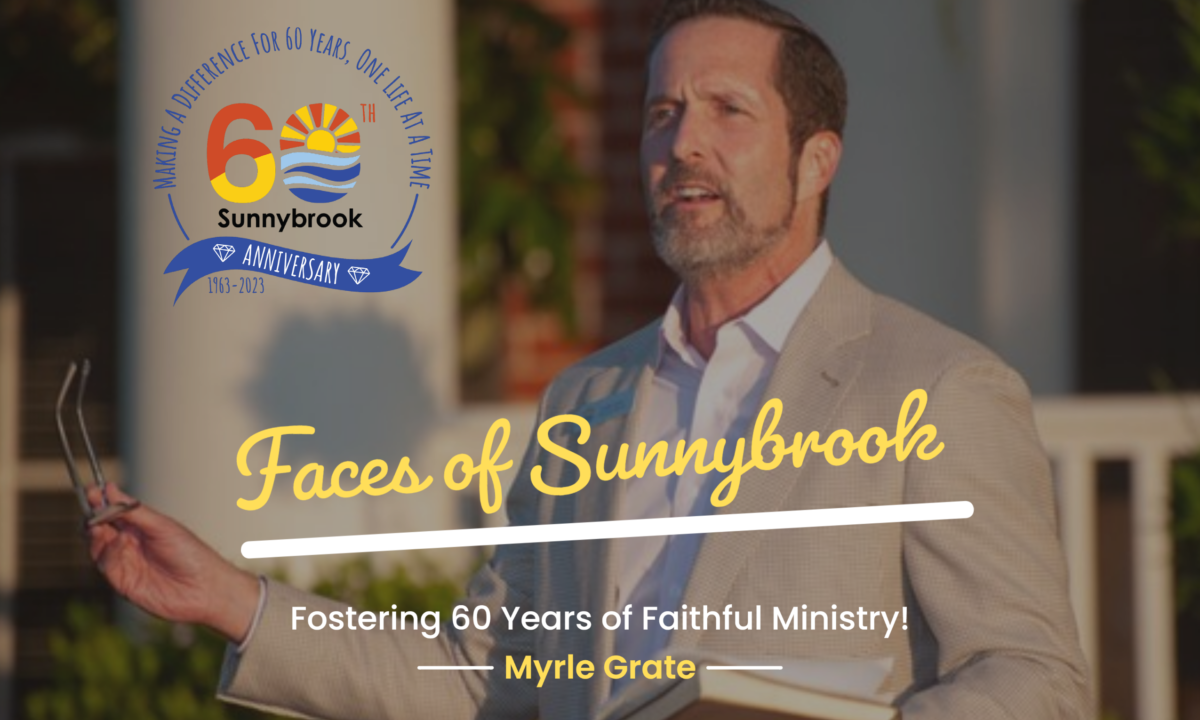Launching a new foster care program for adolescents might seem daunting for some, but not for Executive Director Myrle Grate. When asked to lead the charge he accepted the challenge without question.
Grate embarked on his calling at Sunnybrook three years ago when he was tasked with transitioning the service population from foster children of all ages to adolescents aged 16-20. Before accepting the position as Executive Director, he worked for an organization that supported terminally ill children and later served as executive pastor of a church. His background in youth ministry and pastoral leadership prepared him to effectively rebuild the programs at Sunnybrook, implementing new curricula designed for adolescents.
“My entire ministry career has been centered around working with young people and youth. When the opportunity became available to come and work at Sunnybrook, it was a very special place that was well positioned to reach into the lives of some children and young adults who desperately needed help. We have been able to do that over the past few years,” Grate said.
He encountered the foster care and adoption system for the first time 20 years ago when he and his wife adopted their son, Micah.
“The adoptive experience we went through was very enlightening for us, it was special to see Micah’s birth mom’s face of gratitude as he transitioned from his parents to us. After raising an adoptive child, I have a better understanding of the children who are placed in my care at Sunnybrook,” Grate explained.
“Foster care and adoption, models what we think of our relationship with God, and it also models in many ways what we do here at Sunnybrook.”
Adolescents arrive at Sunnybrook feeling rejected and lost but leave with the acceptance and healing that stems from a loving, restorative relationship. Seeds of faith are planted every time they experience the love of Christ through staff at Sunnybrook.
About Sunnybrook
“Sunnybrook is a place that provides love and support to young people as we equip them to become adults who are personally, professionally, and spiritually mature,” Grate said.
Four homes located on Ridgeland’s campus provide a safe haven for Sunnybrook’s foster youth and their houseparents. Three are designated for high school aged youth and the fourth is dedicated to recent high school graduates ready for supervised independent living.
A five-star hospitality home offers respite stays for foster care families throughout the state. Sunnybrook recognizes the vital need for rest and rejuvenation among families committed to providing a supportive home environment for foster youth, and the hospitality home successfully meets this need.
In about a month, Sunnybrook and its partners will open a safe house for youth victims of sex trafficking, the only safe house of its kind in Mississippi.
Each foster youth in Sunnybrook’s care receives a safe place to live, counseling, driver’s education, financial literacy, workplace readiness, and life skills.
While the ability to drive is often taken for granted, it is a skill many foster adolescents don’t possess. Without a license, it’s that much harder to secure gainful employment, run necessary errands, or even hang out with friends. Many foster youth face challenges gathering required documents to obtain a driver’s license, such as a birth certificate and social security card. Or they aren’t afforded the opportunity to drive 50 hours with an adult, another requirement to secure a license in Mississippi. Without the support and resources needed to acquire a license, the majority of foster youth leave the system without one.
This summer every 16-year-old residing at Sunnybrook will meet with a private driver’s education instructor to complete the 50-hour driving requirement for a license. If necessary, requests are made to the appropriate agency for missing legal documentation. With a driver’s license in hand, Sunnybrook graduates can go places after leaving the program.
As part of Sunnybrook’s financial literacy program, residents learn how to save money and budget appropriately for a car. Through a partnership with an organization that matches up to $3,000 for a car, teens can purchase their own car with cash and drive it off the lot debt-free.
The 40-hour financial literacy program teaches how to effectively manage money and live independently after graduating from the program.
A work readiness program prepares Sunnybrook youth for the world of work. With a foundation in Christian values, youth learn how to behave professionally on the job and maintain steady employment.
“We value the Work Life, and Faith and Finance curriculums we teach. They have a significant impact on these residents teaching them both soft skills and hard skills for job readiness and managing the finances they receive as a result of having a job,” Grate explained.
“So many programs focus on workforce development, which is getting certificates and training so young people can get a job. The ministry focus of Work Life, and Faith and Finance is helping them to retain that job once they get it,” Grate said. “How do they have conversations with their manager, how do they make sure they show up to work on time, what are the things they should and shouldn’t do there. We have had much success teaching our residents how to be good employees.”
In addition to these programs, life skills such as laundering, cleaning, and cooking are taught and modeled at Sunnybrook.
The Statistics Tell the Story
When it comes to success, the numbers don’t lie. Sunnybrook’s foster youth program surpasses national and state programs in its holistic approach to developing independent living skills. From employment to financial literacy and driver’s education, Sunnybrook proves its worth again and again.
Employment
National statistics reveal 14% of 17-year-olds in foster care are employed compared to 100% of Sunnybrook youth aged 17. 64% of foster youth participants of a state job placement program were employed six months after graduating from the program while 100% of Sunnybrook youth were employed six months after completing the workforce readiness program.
Financial Literacy
A recent study conducted by Sunnybrook staff in early 2023 revealed approximately 22% of foster care youth throughout the state completed a five hour financial literacy program, while 75% of Sunnybrook youth completed a 40-hour financial literacy program.
Driver’s license
At the national level, less than 5% of foster care youth leave the system with a driver’s license, compared to 100% of Sunnybrook youth.

Over the past three years, Grate has sustained Sunnybrook’s vision while successfully transitioning the service population to an older age group. By implementing faith-based programs designed for adolescents, Sunnybrook teens are better prepared to secure gainful employment, access reliable transportation, live independently, and provide for their own needs.
As Grate carries the torch into the future, Sunnybrook will seek to offer a supportive, loving home to teens who need it most no matter what it takes.
“Sunnybrook was founded in 1963 to serve the greatest needs of the foster care community,” Grate said. “After 60 years of impact and evolution, we still embrace solving the complex challenges of the moment and we’re very proud of the stable, Christian, family environment we’ve built to uplift society’s most vulnerable members.”
The Legacy of Sunnybrook Lives On
If you’re new to Sunnybrook or want to be reminded of the glory in Sunnybrook’s ministry, we invite you to celebrate with us by visiting our 60th Anniversary page as we capture 60 years of storied impact that continues to make a difference, one life at a time.

